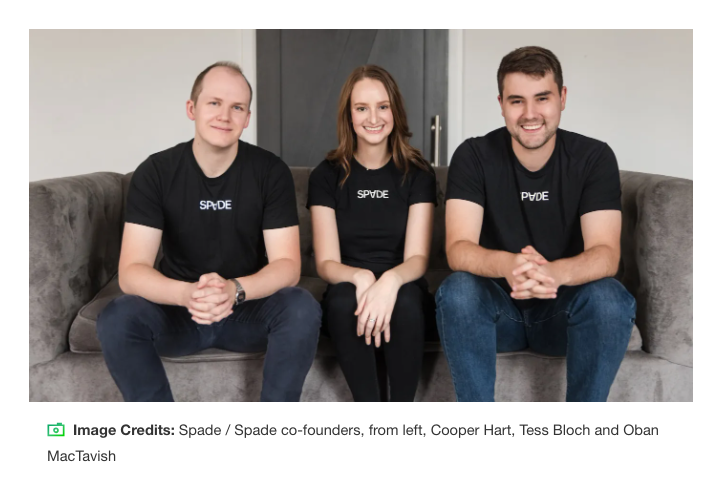[TechCrunch] Spade digs into credit card fraud detection intelligence following new capital raise

Originally posted on TechCrunch
With billions of credit card transactions processed daily, there is opportunity for fraudulent activity, or perceived fraudulent activity, to slip in. And it does: Each year, hundreds of millions of consumers report instances of credit card fraud.
Spade’s co-founders Oban MacTavish, Tess Bloch and Cooper Hart believe much of the fraud can be eliminated if card issuers have access to real-time transaction intelligence.
When we last reported on Spade earlier this year, the company raised $5 million to decipher the string of numbers and letters that card issuers use to authorize transactions in seconds.
When a card is swiped or typed, the issuer sends Spade the data in real time. That transaction is linked with a verified merchant identity and sent back to the issuer with information on who the merchant is, the category and geolocation details, in real time.
Fast-forward to now, and the company is still returning that comprehensive merchant profile. It is also doing it at a rate of under 50 milliseconds with 99% accuracy, which MacTavish told TechCrunch made Spade an industry leader. The average is around 75 milliseconds.
That gives Spade’s customers, including Mercury, Sardine, Ramp and Unit, the ability to have the most accurate data needed to authorize transactions quickly, create innovative card products and enhance fraud detection, in some cases by more than 15%.
“We’ve really shifted our strategy,” CEO MacTavish told TechCrunch. “We found our niche within the fraud detection space, so there’s been a massive push up market for us. Fraud is only becoming a larger problem, especially as banks become more and more sensitive to margin.”
MacTavish declined to get specific about revenue and customer growth, only to say, “it’s been a big year of growth and will be another year of growth for us.”
That “big year of growth” secured Spade another round of funding. It recently raised $10 million in Series A capital led by Flourish Ventures. Also participating was Andreessen Horowitz, Gradient Ventures, Y Combinator, Dash Fund and Everywhere Ventures (The Fund).
Spade plans to use the funds to double its current team of 13 to support its continued technology and product development, data and customer success. The company is also poised to expand outside the United States.
“When selling to banks, the biggest thing is getting your first ‘lighthouse’ bank customer,” MacTavish said. “We will also do more for our customers, including building out functionality on the post authorization side. Beyond that, the total volume of data we transact with is something we’re always keeping an eye on and something we expect it to grow substantially. As we dive deeper into the banking industry, I expect that number to be ‘the North Star’ for us and probably the No. 1 factor leading to a Series B in the future.”